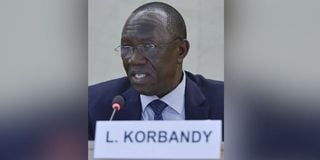Igad names special envoy on Sudan

South Sudanese lawyer Lawrence Korbandy, the new Igad Special Envoy for Sudan.
Regional bloc Intergovernmental Authority on Development (Igad) on Tuesday named South Sudanese lawyer Lawrence Korbandy as Special Envoy for Sudan.
A dispatch from the Igad said Korbandy will provide “pivotal good offices” to engage with stakeholders and help seek common ground for warring factions in Khartoum, including Guiding the bloc on the “way forward.”
Part of his job will be to “strive to put an end to the multi-tiered nature of the crisis, that is, humanitarian, security, economy, social, political; engulfing Sudan,” a source told Nation.Africa on Tuesday.
He will also help establish “a robust Coordination Mechanism, both in South Sudan and in the region with the sole function of settlement of the conflict in the Sudan,” the source added.
And while the new move signals Igad’s intent to participate in the peace search, it came several months after Khartoum announced a "pause" on interactions with Igad following complaints over perceived bias.
Igad Executive Secretary Workneh Gebeyehu, however, insisted the bloc was keen on seeking a diplomatic solution for the war that will clock one year on April 15.
“The Executive Secretary underscores Igad’s commitment to addressing the Sudan crisis through diplomatic channels. Igad remains dedicated to supporting peaceful initiatives aimed at enhancing regional stability and fostering cooperation,” a dispatch said.
Korbandy’s announcement, is long overdue, as it should have been made last year with the original idea being he should have been reporting to the Igad Quartet on Sudan: Kenya, South Sudan, Ethiopia and Djibouti. However, after Sudan’s protestations, the quartet, sort of, dissolved. Khartoum had specifically accused Kenyan President William Ruto, who was to lead the quartet, of bias.
After that, Igad announced realignment with the Jeddah Process: a mediation arrangement by the US and Saudi Arabia.
Igad’s announcement, nonetheless, follows similar moves by the African Union and the United Nations.
The African Union Commission Chairperson Moussa Faki Mahamat had named the High-Level Panel on Sudan (HLP-Sudan). It is Chaired by Dr Mohamed Ibn Chambas, the AU High Representative for Silencing the Guns, and also includes Dr Specioza Wandira-Kazibwe, Uganda’s former Vice-President and Fransisco Madeira, a Mozambican diplomat who served as head of the African Union Transition Mission in Somalia (Atmis) until 2022.
When the High-Level Panel began work in February, the AU said it was “committed to working with the people of Sudan to end the fighting and put in place a process towards a lasting and inclusive peace, democracy and justice in the country” but asked the international community to support the trio.
UN Secretary-General António Guterres had in November also named former Algerian Foreign Minister Ramtane Lamamra as his Personal Envoy for Sudan.
These moves, however, have not yet brought fruit as parties to the war: Rapid Support Forces and the Sudan Armed Forces, have refused to reach any ceasefire.
Korbandy’s first task was to establish acceptability in both RSF and SAF. When the Sudan Armed Forces first rejected the Quartet led by Kenya, they demanded that mediation be guided by South Sudan, which was once part of Sudanese territory until 2011.
Korbandy used to represent the Sudan People’s Liberation Movement (SPLM) which had fought the north until autonomy was granted in 2005 and later independence in 2011.
Korbandy’s education years were spent as he also helped SPLM to earn support abroad.
He studied law at the University of Baghdad, Iraq, during its peaceful years, as well as development and international cooperation at the University of Barcelona. He was once an SPLM representative in Spain.





